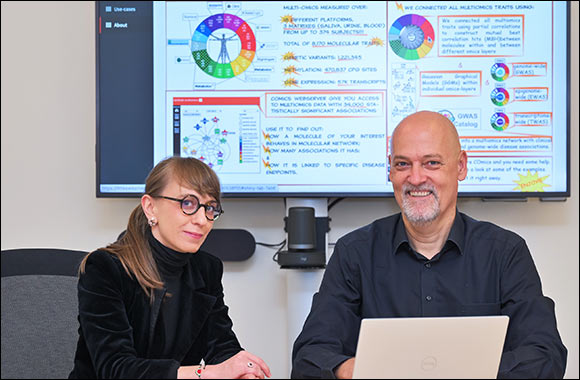
WCM-Q researchers create comprehensive 'molecular map' of the human body
Doha – August 28, 2024: Researchers at Weill Cornell Medicine-Qatar (WCM-Q) have created a vastly intricate molecular map of the human body and its complex physiological processes based on deep analysis of blood, urine and saliva samples from many hundreds of individuals.
The exhaustive study collated data from a wide series of existing research projects conducted at WCM-Q over the past 12 years in which researchers used cutting-edge technologies to analyze the interlinked molecular characteristics that make up each human being, including their genomic data (DNA), their transcriptome (RNA), their proteins, and their metabolites, such as amino acids, sugars and lipids (fats), and other data.
The data from each of the samples, which were collected from 391 participants of the multiethnic diabetes Qatar Metabolomics Study of Diabetes (QMDiab), were mapped to discover associations and pathways linking genetic characteristics with specific proteins, metabolic processes, and diseases. The researchers then painstakingly integrated the mass of data from all of the individuals into a free-to-access online model they call 'The Molecular Human'. The model provides a powerful interactive visual reference tool that can be used by other interested in investigating the complex molecular make-up of humans and discovering the underlying traits associated with various debilitating diseases.
The project, led by Dr. Karsten Suhre, professor of physiology & biophysics, and Dr. Ania Halama, assistant professor of research in physiology & biophysics, has been published in Nature Communications. The approach of combining genomic, transcriptomic, metabolomic, proteomic and other forms of so-called '-omics' research is known as 'multiomics'. Multiomics has emerged in recent years as a key strategy for biomedical researchers seeking to understand how the human body and diseases truly function, providing insights that could potentially enable the development of new drug therapies.
Dr. Suhre said: 'Our idea was to bring together everything we have learned over more than a decade of multiomics research to create a very comprehensive molecular model of the human body and its processes. This reference tool is free to access and use and can be utilized by researchers who want to investigate how the human body works at molecular level and also for the formation of hypotheses to test with experimentation.'
Dr. Halama added: 'A researcher could, for example, use the Molecular Human tool to identify a pathway that shows an association between a particular gene or location within in a gene with a specific sub-type of diabetes or another characteristic. They can then hypothesize that the gene and the disease are associated and design an experiment to test that hypothesis. The scale of the data contained within the model means that there are hundreds of thousands of pathways and associations for researchers to explore, giving huge potential for discovery and investigation.'
The Qatar Metabolomics Study of Diabetes (QMDiab), from which the project sourced its data, was originally designed as a diabetes case-control study in the multiethnic population of Qatar. Through a collaboration with Hamad Medical Corporation, the researchers collected multiple aliquots of blood, urine, and saliva samples from 391 volunteers, with and without diabetes, of predominantly Arab, Filipino, or Indian ethnic backgrounds with the goal of acquiring sufficient material for 'multiomic' analysis (see methods). The collected samples were subsequently characterized on a total of 18 different high-throughput analysis platforms, providing an extremely rich dataset. Indeed, 6,300 individual data points were collected for each of the 391 participants. In addition, samples were genotyped for 1.2 million genetic variants, the white blood cell transcriptome was sequenced at a depth of 20 million reads to quantify the expression of 57,000 transcripts, and DNA methylation levels for 450,000 CpG sites were determined.
The study also utilized the integrated multiomics data to identify and describe molecular milieu of proteins and metabolites which are recognized as signatures of subtypes of type 2 diabetes, shedding light on the different ways the disease manifests.
Dr. Suhre is supported by the Biomedical Research Program at Weill Cornell Medicine in Qatar, a program funded by Qatar Foundation. He is also supported by the Qatar National Research Fund (QNRF) grant NPRP11C-0115-180010 and ARG01-0420-23000. Dr. Halama is supported by the Qatar National Research Fund (QNRF) grant NPRP12S-0205-190042 and NPRP11S-0122-180359.
Home >> Healthcare and Fitness Section
200 Students Dive into Robotics Workshops in Qatar
Artemis Education Appoints World Champion Emma Igelström as Director of Aqu ...
Qatar Insurance Group Recognized at Google Cloud Summit Doha 2025 for Driving In ...
Education Above All Foundation and the American University of Beirut Celebrate t ...
Celebrate Eid with a Summer Glow: Catrice Launches Luxe Highlights for the Seaso ...
Doha Climate Talks Concludes with Enhanced Regional Climate Cooperation Commitme ...
Airline Profitability to Strengthen Slightly in 2025 Despite Headwinds
Luis Gallego Chairs IATA Board
Sony Middle East and Africa and Modern Home Introduce the Next Evolution of Nois ...
The Raptor Roar: A Legacy of High-Performance Off-Road Domination
Saleh Al Hamad Al Mana Co. Launches Special Offer on All-New Nissan Patrol 2025
Raffles doha appoints chef cristhian serraino as head chef of ALBA
essence Is Springing Into Season with the Glowiest Drop: Hydra Kiss LIP OIL
ESG, AI, and Architecture – Object 1's Future-Ready Vision
CASIO Unveils the G-SHOCK GA-2100BM: A Stylish and Durable Summer Essential
SAS Forecasting Hackathon Unveils Future Innovators at University of Doha for Sc ...
Air Cargo Demand up 5.8% in April
Google Cloud Summit Doha Celebrates Two-Year Anniversary of Local Region, Showca ...
Cartier Launches En Équilibre High Jewellery Collection In Stockholm


